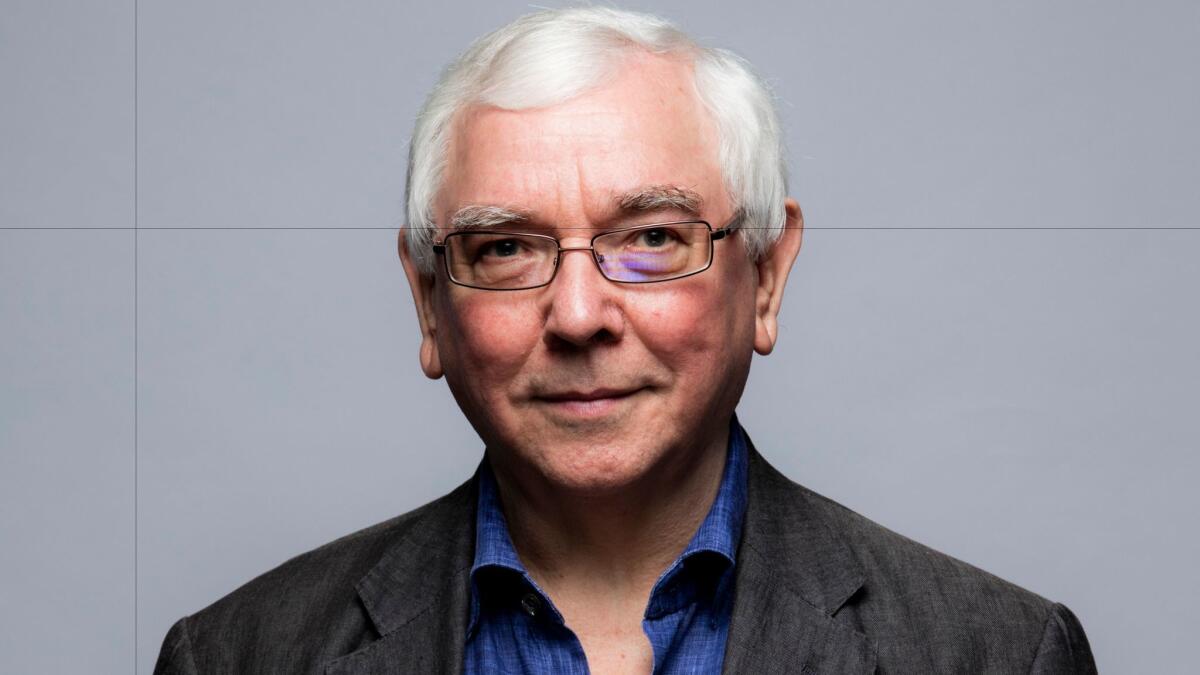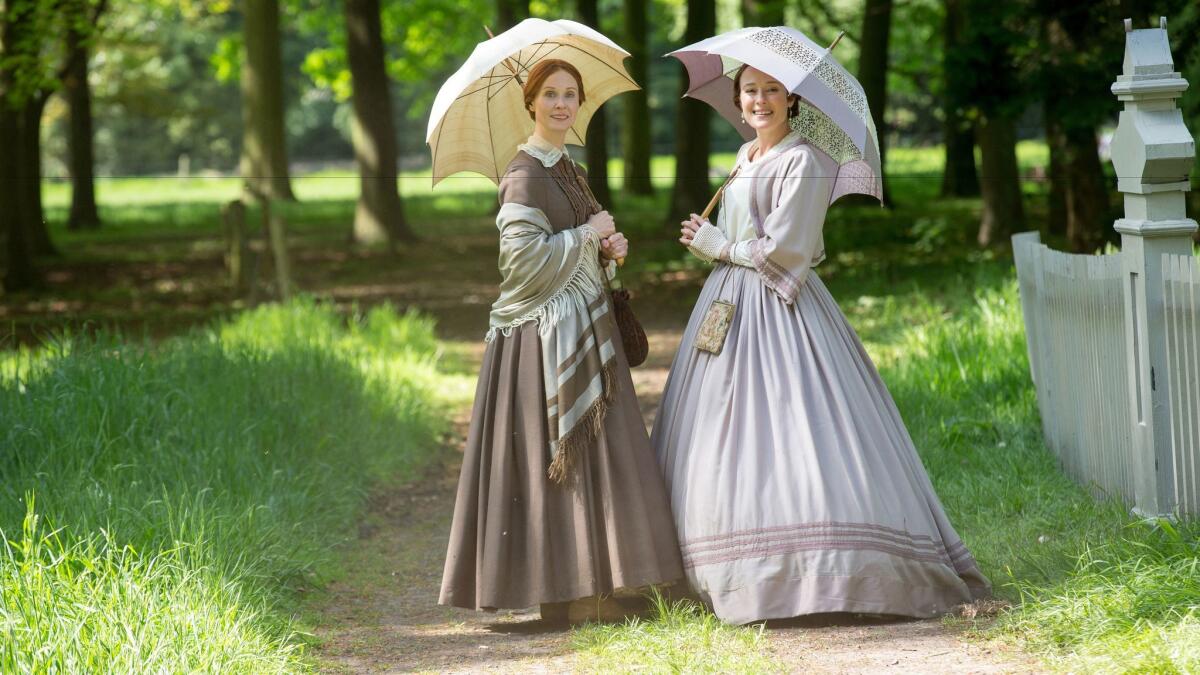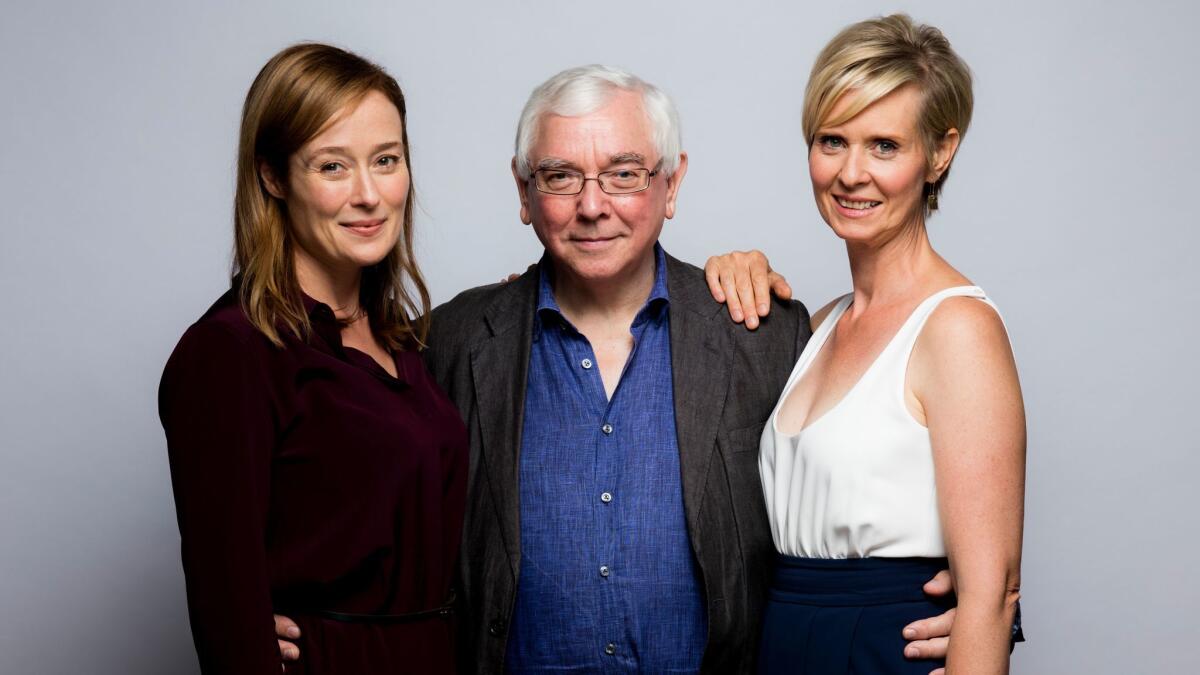Q&A: Witty and bleak, director Terence Davies on his work and the Emily Dickinson film we call ‘masterful’

- Share via
It verges on cliche to say the British director Terence Davies has been the great unheralded director of auteur cinema.
At least, he wouldn’t want you to say it.
But whether with his fictionalized autobiographies “Distant Voices, Still Lives” and “The Long Day Closes,” his Edith Wharton adaptation “The House of Mirth” or his melancholy gem “Of Time and the City” (a nostalgic documentary about Davies’ nonetheless difficult childhood in Liverpool), the self-deprecating Brit has proved to be one of film’s most surprising and original serious directors.
Davies, after all, was taking on taboos of religion (he had a strict Catholic upbringing) and gay sexuality long before they were broken.
His latest film, the Emily Dickinson biopic “A Quiet Passion,” starring Cynthia Nixon, is currently in theaters. Like Davies, it is alternately witty and bleak. The Times spoke to the director on a recent trip to New York.
People say your films can be a little dark — I once heard someone quip that you can make Jerry Lewis look like Ingmar Bergman. Why do you think so much of your work is seen this way?
It’s always a shock when people say my films are depressing. Because you can’t see your own work. I suppose it’s just the way I view stories — I do see the glass as half-empty. Whatever optimism I had was killed as a child. When you see your abusive father dying for two years and then the body is in the house for 10 ten days, that crushes romance. It heightens the need for romance, but it crushes it. My films are not very happy because I’m not very happy.
Well, that sounds … useful for your art, at least?
I'm drawn to films about struggle and darkness. I'm drawn to a certain kind of courage. I'm drawn to creative people who are not recognized.

Religion has always made its way into your films — not so much the mystery of faith, as with that other Terrence [Malick], but as a social force, often destructive.
I was a very devout Catholic as a child — I was told that if you doubt, it was the devil’s work. And from about 15 to 22 I fought like anything [against doubt]. And then one day at Mass I said, “Why? It’s just men in frocks.” And I just walked out. So for you to realize that’s a complete lie leaves you with a hole but also residual guilt. When I was naughty as a child my mother would say shut up. It still haunts me. My conscience haunts me every day.
It’s so easy to be false. It’s easy to make people cry. What’s difficult is to move them.
— Director Terence Davies
Was it the community you were in or do you believe it’s religion generally that has this power?
It’s a system set up to fail. When you try to live and be true to thought and word and deed, it’s impossible. No one is going to do it. You’re always going to fail.
So why Emily Dickinson?
It was the poetry initially. And then I started reading about her life [as an iconoclast and recluse] and I thought it was perfect for a chamber piece. Which it is. You can get intensity from confined paces. It doesn’t matter you don’t go anywhere — she went somewhere spiritually, and that was much more interesting.
Did you see in her own apostasy a mirror of your own?
Well, certainly I don’t want to make any more autobiographical films. But you are a total of your cumulative experience. The best way I think is to have your influences and then forget them, so that when they come out they’re new. What I really want is films to be true. I don’t want anything false. And it’s so easy to be false. It’s easy to make people cry. What’s difficult is to move them.

You went nearly eight years without making a movie at the beginning of the 2000s. And in the past eight years you’ve made four. (The Scottish story-of-becoming “Sunset Song” preceded “Passion.”) And you’ve got the adaptation of Richard McCann’s family novel “Mother of Sorrows” in the works. To what do you chalk up this burst?
It’s been a lovely surprise. I’ve been given an Indian summer — at nearly 72. It’s two bites at the cherry and some people don’t even get the first bite. But I do hope — I said this to people I work with — that they should tell me if I’m not good anymore. If I don’t know, tell me. Otherwise it’s just so embarrassing.
Still, it doesn’t sound as if there will be any golf in your future.
I can’t imagine anything more ghastly — grown people knocking little balls into little holes. Repeatedly. They need help.
You said a moment ago that you’re drawn to creative people who are not recognized. Do you think there’s a parallel to your own career — beloved by film scholars but less popularly known?
I hate to be in a position where my films are only remembered by academics. Try though I might, I’ve never finished “Finnegans Wake” — I don’t know what I’m reading. And reading is supposed to be enjoyable, not a prison sentence. But it’s kept alive by academics. I hate for my films to be remembered [mainly] by some esoteric Ph.D.
Whatever optimism I had was killed as a child. My films are not very happy because I’m not very happy.
— Director Terence Davies
Is there anything you can do, like seek out Hollywood jobs? You did seem like you might be doing that for a while, after “House of Mirth” in 2000.
I haven’t won the big prizes and I’ve certainly not had millions of dollars at the box office. But if I changed to chase audiences and it didn’t work I really would hate myself. I’d feel like a failure and a phony. I would like a bigger audience but I can’t compromise what I felt to be true. I’d rather be loved by few than liked by many. Or as a true Catholic would say, hated by many.
Twitter: @ZeitchikLAT
ALSO
‘Barry,’ 'Neruda' and ‘A Quiet Passion’ put a fresh spin on biopic formula
Only good movies
Get the Indie Focus newsletter, Mark Olsen's weekly guide to the world of cinema.
You may occasionally receive promotional content from the Los Angeles Times.








